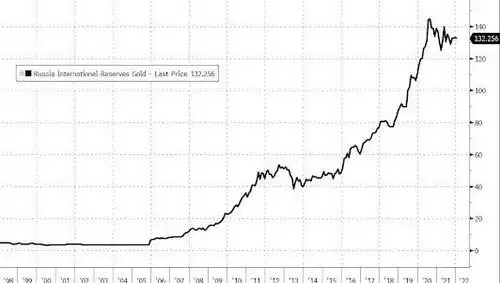Russia, $3600 PetroGold, and China – Geopolitics & Gold
News
|
Posted 12/12/2022
|
16677
On Friday we wrote to the revelation that China was the mystery big buyer of gold in that history making central bank gold buying spree last quarter. Prior to that Russia had been the big buyer until the invasion of Ukraine and a remarkable amount of gold bought up from its own producers. Russia may now have another clever way of acquiring gold whilst avoiding the impacts of USD sanctions and oil caps in a move that one of the most respected world economists says could lead to $3600 spot price for gold.
Credit Suisse’s Zoltan Pozsar produced a research paper last week titled "Oil, Gold, and LCLo(SP)R" where he talks to the likelihood of Putin requiring gold for oil as he bypasses the $60 cap imposed by the G7 the European Union, and Australia on Russian oil. From Kitco:
“In this scenario, Russia's President Vladimir Putin responds to the recently introduced $60-a-barrel oil price cap by asking for a gram of gold for two barrels of crude.
At current market prices, the cap of $60 per barrel for Russian oil equals the price of a gram of gold, Pozsar said. What essentially happens here is the U.S. pegs Russian export at this price, and Russia, in return, pegs it at a gram of gold. And this would come at a time when the U.S. is working to refill its strategic reserves with cheap petroleum.
In this example, "the U.S. dollar effectively gets 'revalued' versus Russian oil," Pozsar pointed out. "But if the West is looking for a bargain, Russia can give one the West can't refuse: 'a gram for more.' If Russia countered the price peg of $60 with offering two barrels of oil at the peg for a gram of gold, gold prices double," Pozsar described.
This is how gold can get to $3,600 an ounce from current levels of $1,794 an ounce.
"Russia won't produce more oil, but would ensure that there is enough demand that production doesn't get shut. And it would also ensure that more oil goes to Europe than to the U.S. through India. And most important, gold going from $1,800 to close to $3,600 would increase the value of Russia's gold reserves and its gold output at home and in a range of countries in Africa," Pozsar described.
But gold doubling would be an issue for banks involved with futures markets as most have assumed that governments won't get back to paying for goods with commodities.
"Banks active in the paper gold market would face a liquidity shortfall, as all banks active in commodities tend to be long OTC derivative receivables hedged with futures (an asymmetric liquidity position)," Pozsar wrote. "That's a risk we don't think enough about and a risk that could complicate the coming year-end turn, as a sharp move in gold prices could force an unexpected mobilization of reserves (from the o/n RRP facility to banks) and expansions in balance sheets (SLR) and risk-weighted assets. That's the last thing we need around year-end."
Whilst some may baulk at the notion of a ‘petrogold’ replacement of the petrodollar Zoltan explains (‘Urals’ is the market term for Russian oil which has cheaper pricing as it is of lower quality):
“Look at the tit-for-tat measures so far: you invade Ukraine, I freeze your FX reserves; you freeze my FX reserves, I make you pay for gas in rubles; the West boycotts my Urals, I'll ship it east... the West caps the price of Urals, let them, but I'll make them pay in gold. And if some countries re-export Urals to the West, I'll make them pay in gold too.”
Such is the geopolitical side to this with no clear answers. Zoltan also quotes economist and ex US President advisor, Pippa Malmgren, who said "World War III already started, it’s just that it is a hot war in cold places (in space, cyberspace, underwater, and Svalbard) and a cold war in hot places (militarizing islands in the Pacific and mines in Africa)."
“Hot wars in cold places also involve corridors of power that determine who gets to use cutting-edge technologies (the U.S.'s technology blockade of China), who gets paid how much for commodities (the G7’s price cap on Russian oil), and how commodity trades get settled (Moscow's demand to get paid in gold as an analogue to Moscow's demand this year to get paid in rubles for gas). War is not about gentlemanly conduct...”
Like China, one can’t know if Russia’s declared gold reserves are actually everything they have but the publicised buy up was remarkable in itself per the chart below.

One could look at the chart above and surmise that Putin was strategically stockpiling gold in readiness for the inevitable world reaction to his invasion of Ukraine. After the sanctions he would only accept Rubles for his oil and gas. That very quickly reverted the Ruble price after it’s initial plunge and forced trading nations to sell their gold for Rubles as well.
Now, again refer to Friday’s article or video, China appears to be doing the same accumulation of gold and one can only wonder if that is in preparation for future military action too. As JP Morgan recently pointed out:
"while the world is short on commodities, China is not given they have started stockpiling commodities since 2019 and currently hold 80% of global copper inventories, 70% of corn, 51% of wheat, 46% of soybeans, 70% of crude oil, and over 20% of global aluminium inventories."
Zoltan’s $3600 gold is based purely on Russian petrogold oil payments. What happens if China resumes its gold buying spree in tandem??? As Zoltan himself says in the article “You can’t print gold”…